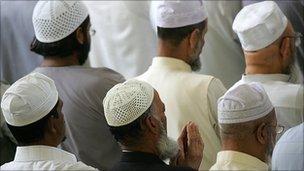Muslims pass on faith at higher rates than Christians says Cardiff University study
- Published

The majority of Muslim children surveyed said they had the religion their parents were brought up in
Muslims in Wales and England practise and pass on their faith at much higher rates than any other religion, a Cardiff University study says.
Researchers found 77% of adult Muslims actively practise the faith they were brought up in, compared with 29% of Christians and 65% of other religions.
They also found 98% of Muslim children surveyed said they had the religion their parents were brought up in.
They said the research suggested religion helps minority communities.
The research found 62% of Christian children surveyed had the same religion of their parents, compared with 98% of Muslims and 89% of other religions.
"There is more involvement of Muslim young people in religious organisations," the study from Cardiff's School of Social Sciences and Centre for the Study of Islam in the UK said.
"It is well known that there is considerable supplementary education for Muslim children such as the formal learning of the Koran in Arabic.
"The apparently much higher rates of intergenerational transmission in Muslims and members of other non-Christian non-Muslim religions are certainly worthy of further exploration and may in fact pose a challenge to blanket judgements about the decline of British religion.
"These higher rates might suggest support for the theory that for minority ethnic populations, religion can be an important resource in bolstering a sense of cultural distinctiveness."
Prof Jonathan Scourfield, one of the researchers who took part in the study, said the statistics pointed to the importance of religion for people in minority communities.
"Muslim children tend to lead busy lives, often attending religious education classes outside school three or more times each week on top of any other commitments they have," he said.
"They typically learn to read the Koran in Arabic. They also learn a great deal about their faith from parents and other family members.
"Religion can have an especially important role for minority communities in keeping together the bonds between families from the same ethnic background."
The team analysed data from the Home Office's 2003 Citizenship Survey data, using 13,988 replies from adults and 1,278 from young people aged 11 to 15.
- Published14 February 2012
- Published23 December 2011
- Published9 December 2011
- Published22 September 2011